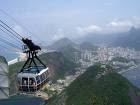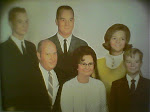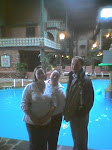Heritage Church of God
Take a look around, make yourself at home.
You will find some of my favorite things, and some of my innermost thoughts.
Poems, quotes, music, preaching, and a few funny things.
Take your time, add your comments, and come back as often as you like.
You will find some of my favorite things, and some of my innermost thoughts.
Poems, quotes, music, preaching, and a few funny things.
Take your time, add your comments, and come back as often as you like.
Wednesday, February 4, 2009
Lawmaker says SEC hindering House's Madoff probe
WASHINGTON – House lawmakers on Wednesday accused the Securities and Exchange Commission of impeding their probe into the agency's failure to uncover the alleged $50 billion Bernard Madoff fraud.
The clash between lawmakers and high-ranking SEC officials at a House Financial Services subcommittee hearing came after the man who waged a decade-long campaign to alert the regulators to problems in Madoff's operations denounced the agency for its inaction. Whistleblower Harry Markopolos also said he had feared for his physical safety and would turn over new evidence that Madoff had not acted alone.
In loud, angry exchanges, lawmakers threatened to issue subpoenas to SEC officials to compel their testimony in the case.
Pennsylvania Democrat Paul Kanjorski, the panel's chairman, vented frustration after the SEC's acting general counsel said the five officials appearing at the hearing couldn't answer lawmakers' questions about the Madoff case because it's under investigation. The five SEC commissioners voted earlier to assert a privilege in not having officials answer lawmakers' questions.
Kanjorski accused the agency of impeding the panel's investigation, calling it a "lack of cooperation" and an "abuse of authority."
Linda Thomsen, the agency's enforcement director, said the SEC takes the Madoff case very seriously, but asserted there were confidential areas related to the ongoing investigation that could not be publicly discussed.
The SEC officials said the agency is looking at possible changes in the wake of the scandal, including more frequent examinations of investment advisers and improving its process for assessing risk.
Because of the SEC's inaction, "I became fearful for the safety of my family," Markopolos said.
"The SEC is ... captive to the industry it regulates and is afraid" to bring big cases against prominent individuals, Markopolos said. The agency "roars like a lion and bites like a flea" and "is busy protecting the big financial predators from investors."
While the SEC is incompetent, the securities industry's self-policing organization, the Financial Industry Regulatory Authority, is "very corrupt," Markopolos charged. That organization was headed until December by Mary Schapiro, President Barack Obama's new SEC chief.
Markopolos discovered additional funds that funneled money to Madoff — whose managers he said willfully turned a blind eye to his improprieties because they were paid generous fees. Markopolos said he will present his findings to the SEC's inspector general. If proven, they would substantiate the assertions of many analysts that the alleged fraud was far too large for Madoff to have conducted alone.
In New York, a trustee liquidating Madoff's investment firm told a federal judge Wednesday that nearly $950 million in cash and securities has been recovered for investors. Trustee Irving Picard said $111.4 million in cash had been recovered from financial institutions and about $300 million in securities were identified although it was unclear what they were worth.
JPMorgan Chase & Co. and Bank of New York Mellon Corp. last week said they would transfer a combined $534.9 million from Madoff's investment firm accounts to Picard. Investors have until July 2 to place their claims.
European investors who feared they lost millions investing with Madoff have a chance to recoup some or all of their money from the banks that marketed the stricken funds, according to lawyers in Europe who are preparing a possible U.S.-style class-action lawsuit.
Back in Washington, the SEC has been sustaining volleys of criticism from lawmakers and investor advocates over its failure to discover Madoff's alleged $50 billion fraud, which could be the biggest Ponzi scheme ever, despite the credible allegations brought to it over years. Against the backdrop of the worst financial crisis since the 1930s, the SEC is being accused of further eroding investor confidence and lawmakers of both parties are calling for a shake-up of the agency.
Madoff, a prominent Wall Street figure, was arrested in December after allegedly confessing to bilking investors in what the authorities say was a giant Ponzi scheme, possibly the largest ever. His repeated warnings to SEC staff that Madoff was running a massive pyramid scheme have cast Markopolos as an unheeded prophet in the scandal.
"The SEC was never capable of catching Mr. Madoff. He could have gone to $100 billion" without being discovered, Markopolos testified. "It took me about five minutes to figure out he was a fraud."
Markopolos, a former securities industry executive and fraud investigator, brought his allegations to the SEC about improprieties in Madoff's business starting in 2000 after determining there was no way Madoff could have been making the consistent returns he claimed using the trading strategy he touted to prospective investors.
Markopolos and his team of four investigators fruitlessly pursued the quest through this decade with agency staff from Boston to New York to Washington, raising 29 specific red flags regarding Madoff's operations. But the SEC never acted.
Now thousands of victims who lost money investing in Madoff's fund, which was separate from his securities brokerage business, have been identified. Among them are ordinary people and Hollywood celebrities — as well as big hedge funds, international banks and charities in the U.S., Europe and Asia. At least one investor apparently was pushed to commit suicide.
Markopolos disclosed that he anonymously conveyed a package of documents on Madoff to former New York attorney general Eliot Spitzer, but noted Spitzer took no action. Spitzer's family trust was among the victims that lost money investing with Madoff.
Markopolos also suggested that senior editors at The Wall Street Journal may have prevented a reporter from pursuing leads he provided because the newspaper "respected and feared" Madoff.
Madoff, who was at one point chairman of the Nasdaq Stock Market and sat on SEC advisory committees, was "one of the most powerful men on Wall Street and in a position to easily end our careers or worse," Markopolos said.
Markopolos recommended ways to revamp the SEC, including replacing its senior staff and establishing a central office to receive complaints from whistleblowers.
In December, Christopher Cox, then the SEC chairman, pinned the blame on the agency's career staff for the failure over a decade to detect what Madoff was doing. He ordered the SEC's inspector general, H. David Kotz, to determine what went wrong. Kotz has expanded his inquiry to examine the operations of the divisions led by Thomsen, who has been the enforcement chief since mid-2005, and Lori Richards, who has headed the inspections division since mid-1995.
Schapiro has said that because Madoff carried out the scheme through his investment business and FINRA was empowered to inspect only the brokerage operation, it wasn't possible for the organization to discover it.
Friday, January 23, 2009
This is a great first step
WASHINGTON -- Human rights activists and advocates of open government are cheering U.S. President Barack Obama's decisions to close the Guantanamo Bay detention center and to signal the start of a new era of clean government by signing strict new rules on transparency and ethics.
His actions on January 21 -- his first full day in office -- overturned policies enacted during the administration of George W. Bush that cloaked the government in secrecy and prevented reporters from obtaining information. Obama declared that his administration is making a "clean break from business as usual."
With a stroke of his pen, the new U.S. president froze the salaries of his top aides, limited the influence of lobbyists, and opened government agencies to public scrutiny.
It was a fulfillment of his campaign promise to change the way Washington operates and make government more accountable to the people.
"Transparency and the rule of law will be the touchstones of this presidency," Obama said. "Our commitment to openness means more than simply informing the American people about how decisions are made. It means recognizing that government does not have all the answers and that public officials need to draw on what citizens know."
'That Era Is Now Over'
Obama's two executive orders and three presidential memorandums reversed controversial policies enacted by his predecessor, George W. Bush, that made it easier for the government to deny requests for information under the Freedom of Information Act and to keep secret the papers and records of former presidents.
...the United States intends to prosecute the ongoing struggle against violence and terrorism, and we are going to do so vigilantly, we are going to do so effectively, and we are going to do so in a manner that is consistent with our values.Obama called the Freedom of Information Act "perhaps the most powerful instrument we have for making our government honest and transparent, and for holding it accountable." He said he expects members of his administration to carry out not just the letter, but the spirit, of the law.
"For a long time now, there has been too much secrecy in this city. The old rules said that if there was a defensible argument for not disclosing something to the American people, then it should not be disclosed," Obama said. "That era is now over. Starting today, every agency and department should know that this administration stands on the side not of those who seek to withhold information, but those who seek to make it known."
Obama signed the orders in a room filled with his cabinet members and new staff, and told the group that public service is about "advancing the interests of Americans," not themselves.
That philosophy underpinned his decision to eliminate what is known as the "revolving door" in Washington, a lucrative practice rife with conflict-of-interest concerns that involves former government officials working as lobbyists, and former lobbyists working in government.
Obama said he decided to freeze the salaries of his top aides because most Americans have had to make financial sacrifices and his administration should not be exempt from the same hardship.
'Optimistic Start'
Ann Weismann, chief counsel of Citizens for Ethics and Responsibility In Government -- a Washington group that promotes ethics and accountability in government -- said Obama has set a clear tone of transparency by taking such sweeping action so quickly.
"We were especially thrilled that he [signed] all of these openness initiatives on his first day of office," Weismann said. "It just really highlights the serious commitment he seems to have and his administration will have towards transparency. So we thought it was an enormously important and optimistic start to the administration."
She said for the past eight years, the Bush administration had thrown up "a blanket of secrecy" around its actions and the work of governmental agencies, and Obama has made a "radical break" with the past.
"There was essentially a presumption of withholding during George W. Bush's administration, his eight years in office. And his attorney general had issued a memorandum that said, 'We'll defend your withholding'," Weismann said. "I think what this is signaling is the complete opposite, which is the presumption of disclosure, and really the burden now is going to be not on the [Freedom of Information Act] requester, but on the agency, in the process, to justify why it needs to withhold something. So I think it's a 180-degree shift."
His actions on January 21 -- his first full day in office -- overturned policies enacted during the administration of George W. Bush that cloaked the government in secrecy and prevented reporters from obtaining information. Obama declared that his administration is making a "clean break from business as usual."
With a stroke of his pen, the new U.S. president froze the salaries of his top aides, limited the influence of lobbyists, and opened government agencies to public scrutiny.
It was a fulfillment of his campaign promise to change the way Washington operates and make government more accountable to the people.
"Transparency and the rule of law will be the touchstones of this presidency," Obama said. "Our commitment to openness means more than simply informing the American people about how decisions are made. It means recognizing that government does not have all the answers and that public officials need to draw on what citizens know."
'That Era Is Now Over'
Obama's two executive orders and three presidential memorandums reversed controversial policies enacted by his predecessor, George W. Bush, that made it easier for the government to deny requests for information under the Freedom of Information Act and to keep secret the papers and records of former presidents.
...the United States intends to prosecute the ongoing struggle against violence and terrorism, and we are going to do so vigilantly, we are going to do so effectively, and we are going to do so in a manner that is consistent with our values.Obama called the Freedom of Information Act "perhaps the most powerful instrument we have for making our government honest and transparent, and for holding it accountable." He said he expects members of his administration to carry out not just the letter, but the spirit, of the law.
"For a long time now, there has been too much secrecy in this city. The old rules said that if there was a defensible argument for not disclosing something to the American people, then it should not be disclosed," Obama said. "That era is now over. Starting today, every agency and department should know that this administration stands on the side not of those who seek to withhold information, but those who seek to make it known."
Obama signed the orders in a room filled with his cabinet members and new staff, and told the group that public service is about "advancing the interests of Americans," not themselves.
That philosophy underpinned his decision to eliminate what is known as the "revolving door" in Washington, a lucrative practice rife with conflict-of-interest concerns that involves former government officials working as lobbyists, and former lobbyists working in government.
Obama said he decided to freeze the salaries of his top aides because most Americans have had to make financial sacrifices and his administration should not be exempt from the same hardship.
'Optimistic Start'
Ann Weismann, chief counsel of Citizens for Ethics and Responsibility In Government -- a Washington group that promotes ethics and accountability in government -- said Obama has set a clear tone of transparency by taking such sweeping action so quickly.
"We were especially thrilled that he [signed] all of these openness initiatives on his first day of office," Weismann said. "It just really highlights the serious commitment he seems to have and his administration will have towards transparency. So we thought it was an enormously important and optimistic start to the administration."
She said for the past eight years, the Bush administration had thrown up "a blanket of secrecy" around its actions and the work of governmental agencies, and Obama has made a "radical break" with the past.
"There was essentially a presumption of withholding during George W. Bush's administration, his eight years in office. And his attorney general had issued a memorandum that said, 'We'll defend your withholding'," Weismann said. "I think what this is signaling is the complete opposite, which is the presumption of disclosure, and really the burden now is going to be not on the [Freedom of Information Act] requester, but on the agency, in the process, to justify why it needs to withhold something. So I think it's a 180-degree shift."
Subscribe to:
Comments (Atom)











